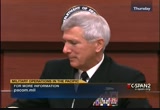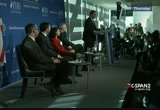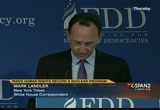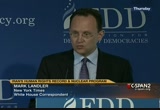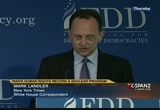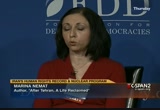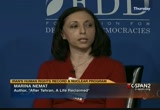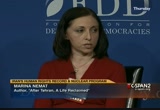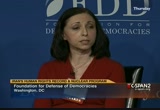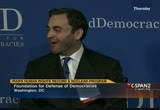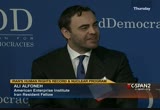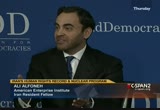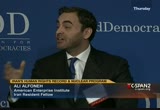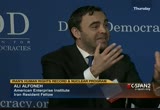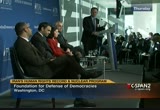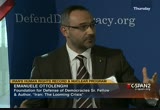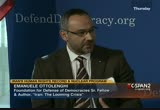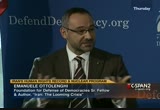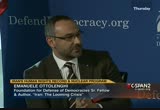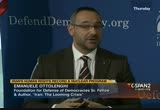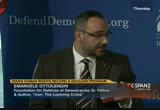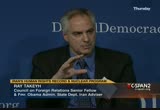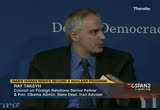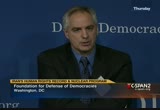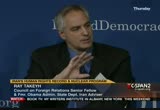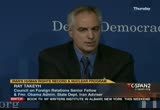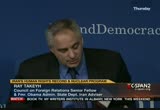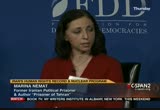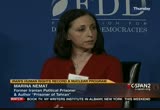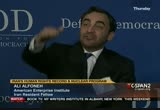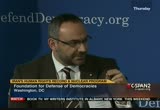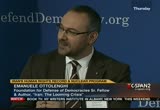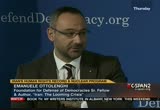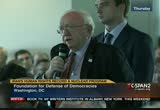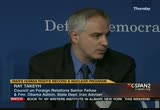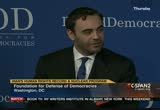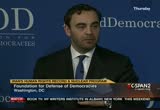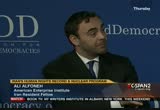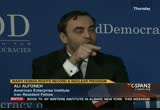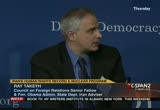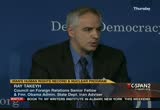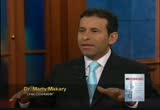tv Public Affairs CSPAN December 7, 2012 7:00pm-8:00pm EST
7:00 pm
>> here's a look at our prime time lineup on the c-span networks. at 7 eastern on c-span, virginia senator mark warner on his plan to allow more highly-skilled immigrants into the u.s. at 8 eastern on c-span2, the president and incoming ceo of the nation's second biggest provider of medicare health plans, and at 8 eastern on c-span3, a discussion on scientific predictions about the future and the impact they have on public policy. ..
7:01 pm
but i think that there's no other art form so readily accessible other than perhaps film, which we work with, too. but it is something -- there is something in literature that just captures the human spirit. >> this weekend, we look behind the scenes at the history and literary life of new york's capital city, albany. saturday at noon eastern on booktv own c-span2, and sunday at 5:00 p.m. on american history tv on c-span3.
7:02 pm
>> now, a former iranian political prisoner talks about the abuse she suffered. she is joined bay former obama administration at visor on iran who discusses iran's program. the foundation for the defense of democracies held this event. >> good morning. it's a very interesting panel so i want to get quickly into questions. very quickly set the stage. i don't need to tell anyone who is in this room about the depth of the problem of human rights abuses in iran. i would just read very briefly from the report that the u.p. report filed for the u.n.gen assembly when it was highlight, quote, pattern of systemic
7:03 pm
violations of human rights. iran has refused access to the united nations for several years, and the ug general assembly submitted a report in which he said he was, quote, deeply troubled by increased numbers of executions. a pew addition, arbitrary arrests and detention, unfair trials, torture, and ill treatment, and crackdown on human rights activityist, lawyers, journalist, and opposition activists, and to draw an example from the week's news theres actually what i gas what qualifies in iran for a slight bit of goodness. a well-known human rights lawyer ended her 49-day hunger strike on december 4th. her name is nasarn, and she has
7:04 pm
in prison since 2010, and the regime imposed a travel ban on her husband and her daughter so she was on a hunger strike for 49 days, and has actually stopped the hunger strike amid word the regime is going to lift the travel ban. so, the victories are small and hard-on and the news is relentlessly negative, but it comes at an interesting moment both for iran, which has apartmently elections next june, typically during periods of time when there is that democratic process. there's even greater and international scrutiny on iran's human rights record.
7:05 pm
trying to prevent the iranian nuclear program from arriving at the point where they're actually able to produce a weapon, and how you tie an antiproliferation policy with a human rights policy is an issue that is often been difficult for policymakers to reconcile. so, why don't i quickly just open it up. maybe i'll start with marina, since your experience at this is so personal, and maybe ask you just on a very basic level whether you think life for ordinary iranians has gotten better or worse? the last few years, and just give us a kind of -- your best sense of what the human rights landscape looks like today versus, say, five years ago or a decade ago. >> well, i guess this all depends on how much people know here about how bad, the absolute disregard for human rights iran
7:06 pm
is in general. i don't know how much you know actually about it. in 1979, when the revolution succeeded, we hoped that iran would actually become a democracy but that was not the case. my dad was a ballroom dancing instructor in iran. i'm actually a christian in iran, and dancing became illegal, holding our boyfriend's hand in public was illegal, and in school we had to cover our hair and ourselves, and i had grown used to wearing t-shirts and wearing a bikini, and all of this became illegal so in classroom, in science and literature and geography, these are the early days 1980. our subjects were replaced by government propaganda. i had grown up readingern necessary hemmingway and poetry
7:07 pm
and now i had to face propaganda eight hours a day and i was 14 years old. what do you think when having fun becomes illegal? how political can a 14-year-old get? but you the 14-year-old becomes political. that was the basis of all the protests that began in iran as early as 1980. now, sharia law came into iran very early after the revolution, and under sharia law democracy and freedom of the citizen is impossible. the thing of sharia law that govern iran in 1979 and 1980 are still in place. they're have something cosmetic changes here and there depending on what administration is
7:08 pm
president of iran. if you wore nail polish you could get away with it. but does that really make a big difference? does that mean that iran becomes free and independent are in khamenei? no. under this constitution freedom and democracy in iran is impossible. i'm sure you all know about the american hostages. everybody knows about that. but just after those hostages were released, i was in prison in iran, and at the time we became the leader of the movement was the prime minister. now, i was -- just explained with cable. and then -- then they make you
7:09 pm
walk and then when the sun goes down, they beat you again. it's a cycle. -under things in the better now for political prisoners in iran? no, they are not. it's exactly the same. it's not worse, it's moe system -- more systemic. that is the situation in iran. when the hostages were freed, thousands of iranians who were prisoners -- did not hear about them. we were thinking, this can't be real. 90% of us were under the age of 20 and we were waiting for the world to say something, and news does come into the prison. nobody said anything. the world didn't care. the world didn't know. i don't know what was wrong with the world but there was something definitely wrong, and that is why i'm here. i'm here to make sure that the
7:10 pm
stories of iranian political prisoners, including the ones that are now in prison, is heard and heart goes to every single one of them, and by the way, if you're interested in helping them, please come up to me afterwards. >> thanks, marina. [applause] >> ali, i'd like to ask you, in the last few years, those of us who write about iranian sanctions policy, have heard a lot about the increasing power and -- the revolutionary guard corps and hillary clinton said iran is edging closer to being a military dictatorship. i wonder when marina talks about this kind of long history of abuse of political prisoners, whether the agents of that abuse have changed over this 20-30
7:11 pm
year span, and whether the increased role of the irgc has an impact on the human rights landscape? is the power of the military in iran actually making matters even worse? >> thanks very much, ladies and gentlemen, and thanks for arranging a panel discussion about human rights. it's rather interesting that in this city, washington, dc. most panels about iran are about the nuclear program and almost nothing about the political prisoners. it send a terrible signal to the iranian public because it means you do care about your own security, you do care about the implications of the islamic republic becoming a nuclear armed state, but what happens in iran does not matter to the washington elite. this is the signal washington has been sending to iran, and i
7:12 pm
think this panel and initiative to make human rights issue more important issue on the agenda, a signal to the iranian public telling them you do understand that a government which is treating its own population can of course not be trusted when it comes comes to its international relations, and just imagine how it would behave if it is also armed with a nuclear weapon. the revolutionary guard inherited the state. then khomeini was making promises in the 1960s and 1970s. he promised the people of iran not democracy. he promised them justice in this world and salve vacation in -- salvation in the next. so, no one has returned from the
7:13 pm
other world to tell us if they actually achieved salvation. but we know about the justice for news this world, and the system is legitimatizing it's treatment. iranians are mostly muslim, bought very different understanding. the government of iran. and they, for example, do not understand the way that sharia law was practiced. at the time that you were in prison, and i have to say, this -- was lucky, at that time we had a prosecutor general of the revolution area tribunal. he was also called the hanging judge of tehran. one time he was invited to the
7:14 pm
city of -- the province of kurd -- kurdistan in order to look at prisoners. i believe there was 100 kurds who were accused of some kind of vague revolution activity, and the judge did not have time to go through the cases so he just said, shoot every second of them. and then people asked him, sir, some of these people may be innocent? and he had a sense of humor. he said, well, you see, if they're innocent, they'll go to heaven. if they have committed in sin against the revolution, they receive their punishment. this is how the system was working back then. now it is a different type of system. you have revolutionary guard officers which represent a new generation of iranians. they're replacing the old
7:15 pm
crafts. the old political class, it's you, you, you, at the universities. studying theology. the new generation spent its youth at the iran-iraq war. just warfare, just like iran-iraq war, and also world war for the german. the jeremy machine youth out of world war i were vindictive and wanted to correct the injustice of the past. for them, correcting the injustice was more important than making germany a better country. unfortunately, we see similar tendency among many revolutionary guard. they no longer have a religious base the same way the clerics have but are using terror in order to control the population, particularly they're fond of show trials. staliniist show trials. we have people who are the
7:16 pm
rulers of iran in he 1980s, who today themselves have been slaves to the system. they show up at trials, and they confess being agents for the cia , mousad, and of course no one believes. no one. not a subject iranian believes these people, who served the revolution have completely become counterrevolutionary. but the idea is to look into the hearts of the iranian public, telling them that the chosen prime minister of khomeini, if he is not -- if he has to appear on short trial, if people who were cabinet ministers in the
7:17 pm
1980s have to an short trial. this this change which is taking place. >> thanks, ali. emanuel, i wanted to move on to you, in light of what marina said about the indifference she felt during her period of imprisonment from the west, or from the outside world, and given ali's observation that even having panels on iran human rights record is somewhat of a novelty in washington, what does that stay about what the west is doing? what measures the west -- the united states are taking specifically aimed at iran on its human rights record as opposed to proliferation or anything else. >> first of all i want to thank my co-panelists and the audience, and fdd for giving me the opportunity to speak here today.
7:18 pm
it's a pleasure to be here. the last couple of days, i wanted to look specifically at the kind of policy that our present in the basket of western policy, vis-a-vis iran when it comes to human rights. theaves service has a useful summary page of everything having to do with human rights for every country they have relations with, including iran. and the one thing that jumped to my eye, the great contribution to human rights on that pain washing the indication that european guidelines on human rights on a vast variety of subjects, from women's rights to death penalty and freedom of speech, was also available in farsi. and it kind of struck me how amazing it is -- i'm sure that
7:19 pm
millions of iranians are rushing to the west side of the european union to read the guidelines of human rights which clearly are having a great impact or thin life. one of the problems we're confronting -- it is a real problem. ali alluded to it. we are confronted with a huge dilemma. the dilemma is the following. want to stop iran from having nuclear weapons and the reason why that if you pursue a policy of support for democracy in iran at the same time, the regime will move away from negotiations and if we have to choose between depriving the regime of nuclear weapons or depriving the regime of its power inside the country, it's easier to achieve the former rather than the latter and it's better overall, that we
7:20 pm
can live with a authoritarian iran without nuclear reps and try to pursue a free iran, we might end up with a nuclear armed awer to tearan iran. so it's a dilemma but doesn't serve our purposes well. we haven't invested significantly on creating human rights tools. there's a lot of things we can do to increase our policy. and by the way, there's something about interest about increasing if in the since we want to force the regime to make a choice between a nuclear arsenal and survival, the best way to convince them it's time to negotiate is to tell them, you know, we're going to do everything in our power to bring you down before you achieve nuclear weapons. so i think there's -- also,
7:21 pm
obviously supporting values which we believe are intrinsic to human nature, after all, we call them human rights because we believe they are what we are. it's not a good thing to be standing for human rights where it's convenient, and not supporting them outside the western world. so, there is a long list of reasons why we should be more active and what we should do. well, again, there are many things we can do. one thing i think worked very well vis-a-vis the iranian public, which is no great fan of their open government -- is to speak and use the tools of public diplomacy, which we have in our power, a lot more effectively, a lot more insistently to convey the message we support democratic change inside the country, we want to see the regime held accountable for human rights, and just to give you one practical apple of -- example of
7:22 pm
what we do. the work i'm conducting and colleagues are conducting is that while we're making it extremely difficult often times for real true dissidents to come out of iran or, once they're out of iran, to get support from western governments to become active in the propossession of change inside the country week rather lax when it comes to providing visa to members of the regime, former members of the regime, children of members of the regime, who are freely coming to the west to spend time as research fellows at ivy league universities, who are buying property and investing in our own markets, who are spending time at the respectable institutions who are using our financial system tone rich themselves. i was recently told that the son of a very prominent member of mahmoud ahmadinejad's cabinet
7:23 pm
used the two-tier exchange system existing in iran today to buy pounds, go to an exchange and back into reals and then go back to iran and buy himself a nice apartment in north iran. these are the things happening on a daily basis that are enraging iranians, that we are allowing out of probably negligence or our underwhelming due diligence when it comes como our immigration policy and who comes in and who goes out. and if we change just that, we would send a powerful signal inside the country. >> ray, you russelled with this issues in the early days of the obama administration. i wanted to put the same question as emanuel formulated it to you, which is how does one integrate or reconcile an aggressive policy on human rights with a policy that is
7:24 pm
very centered on nonproliferation, is it impossible to do it? emanuel says there is a bay and in fact used the word expedient. i would note that the administration took fair amount of criticism after the green revolution for not speaking up strongly enough, early enough, as the crackdown began there it's also worth noting that about a year ago, the u.s. announced a set of sanctions on irgc and other officials on their human rights abuses, which is somewhat different. these sanctions were different than the typical sanctions which are very much aimed at proriff -- proliferators. so the administration would argue they have tried to grapple this. how would you answer that question.
7:25 pm
[inaudible] >> talk into the mic. >> i think when you kind of look at this issue, which is not upstrictly a u.s.-iran issue but it's imbedded in an international structure. that really began to deal with this issue as a proliferation issue and probably about 2005 and 2006. and since then, the iran issue has been sort of ensconced in a context of international organizations, and the basis of iting in the international organizations is iran's violation of its obligations show. conversation settles on proliferation. and for all the countries that are dealing with this, the british, the french, the germans, russia, china, so on, they all ten to view this as proliferation problem. so the conversation taking place
7:26 pm
between iran and the other side tends to be about that issue. very narrowly focused. so, to kind of move that conversation you have to figure out a different architecture to address that. but the process as such is designed to deal with the proliferation issue and the conversation is that it has to do with iran's violations of the npt and security council resolutions suggest iran has suspended activities and so on. but it's a proliferation centered issue. there are two countries who suggest the issue between -- this is not a proliferation issue bottle's do with the character, and those two countries are, one, israel, who doesn't view this as arms -- and the second one is iran, who, although this is an arms control issue from the west but they're using arms control of a way
7:27 pm
of -- there are two actors in this con -- -- so, i think if you look at it historically, the united states has managed to negotiate successfully arms treaties with countries. they tend to be -- history of dealing with the soviet union, particularly in the 1980s, when you see a very aggressive advocacy. there was a set of sanctions you can introduce which has to do with human rights abuses. more can be done with the u.n. representative who is not allowed to go into iran, and not allowed to go into turkey, there is a sizable number of the iranian population who lives in
7:28 pm
turkey, having left rain. do think we have to have some degree of modesty in approaching this issue because there some limitations on the ability of the united states and the international community to effectively alter the behavior of the iranian regime which has such determination. you can introduce sanctions. more should be done about advocacy on behalf of the iran ians which are imprisoned and the regime seems to be sense tonight to that ebuick. in the-door sensitive to that rebuke. the europeans would advocate the penal system in iran. all those thinks can work with the arms control approach, and the arms control approach is likely to be predominant. that's the reality of the situation, simply because
7:29 pm
everybody agrees, this is an issue have to pursue. they have agreed this is an issue of immediate and imminent nature. i'm not sure it's such a crisis, but nevertheless, everybody has been invested into this issue. the other actor that i think people don't really talk about as much -- and if you look at the history of the american foreign policy, many of the human rights initiative tend to originate on capitol hill you. look at the treatment of the soviet refuse done nik. and you can see the history. it's important to recognize the bureau of human rights and the state department was originated under henry kissinger who had no concern with human rights but lad to exceed to that because of the pressure from capitol hill. so external groups can have an impact on this issue. the other thing is, the point
7:30 pm
has been mentioned, is an arms control policy or arms control objectives are not going to be impearled by having corresponding human rising advocacy campaign. we have convinced ourself of this that an arms control approach cannot co-exist with the human rights approach because it creates problems. i'm not sure if that is accurate. i think they can coexist. >> i just want to follow up with ray but also with the other panelists on one point ray made, which is that there's a sort of a framework in place for negotiating with iran and tends to limit the dialogue to some extent. the obama administration, president obama, during the campaign, has been open about his desire to try to engage iran
7:31 pm
bilaterally. it's often portrayed as kind of a last-ditch effort at dip application before you might have to resource to other options. would a bilateral negotiation, were that over to come about, give the u.s. an opportunity to engage on human rights issues? i mean, the u.s.' general policy, they want to keep it limited to arms control. is that proper or would there be an opportunity, window for thetas engage with iran on these other -- >> there's always a sort of a conceptual dissidence, a conceptual dispute. there is a group of -- one point of view suggests that the agenda should be kept narrow, because otherwise it gives the iranians the opportunity to divert to talk about afghanistan, bahrain, syria. so the agenda has to remain narrow as a means of focusing issue of our principle concern, meaning proliferation. that's one school of thought.
7:32 pm
the second school of thought is if the agenda is broader you can have agreement on some issues. that has never been resolved, and when the issue remains unresolved the status quo remains. should it be considered as a last ditch effort? i don't think so. we always talk about years of decision, the year of this or that. we have more time on this issue. we always think of it as not having enough time, yet somehow there's always more time. somehow his issue seems to have within its urgency a degree of time flexibility. i don't know how else to explain that.
7:33 pm
we have had bilateral discussions, and i suggest if there's a bilateral conversation,. >> marina, i thought i'd bring you in on this. ray said we need have a sense of modesty about what we hope to achieve. i'd be interested to hear your opinion on that and what you hope for from president obama and the united states in terms of the posture they take and the amount of pressure on iran, and how much of a difference it would make? purely on human rights as opposed to economic issues. >> well, i don't think that any western country can change the behavior of the iranian regime when it comes to the way it treats political prisoners and dissidents. i think that is the realistic
7:34 pm
view. but what happened -- when i was in prison the war was absolutely silent about the fact that there were about -- i don't know -- 40 down political prisoners in prisons, 90% under the age of 20. but what the silence of the world -- on ground zero for us, did for us, who were imprisoned in iran at the time, it robbed us from hope. yes. you cannot change the behavior of the iranian regime but what you can do is to give the likes -- 7,000 political prisoners who are right now in prison, you can give them hope, because the news does get into the prison, and if they actually hear that you in the united states of america -- and i promise you they will hear
7:35 pm
this -- you're standing up for them, and not about this whole masquerade of the whole neck tour thing that almost has become a joke. sive they there'd that you would be literally saving those political princers' lives. i have the luxury of not bag politician. i was in a political prison and i saw with my own eyes how thousands of young teenagers were brutally, massacred, after being tortured, and raped under the name of islam and religion. to be honest with you, all i'm interested in is just saving one life. if i can say one life, then i can die in peace. now, i know the arguments here are -- a lot are political, but for me, it is an issue of practicality, and it is an issue of saving lives. >> do you want to jump in?
7:36 pm
>> give one piece of advice to president obama and the u.s. administration, is doing the exact opposite of my good friend has said. never, ever show mod -- mod cities city when you're negotiates with middle eastern. we know something about trade and negotiation. you go to the negotiation with limited expectation and modesty, you lose everything. you have to start here. this is the attitude you need to have. >> i wanted to question about the relationship between a strategy of economic pressure, which the u.s. and the west is pursuing against iran, and human rights. i guess the -- i'd phrase it this way. the u.s. claims and the p-5 claim that the sanctions have -- there's a lot of evidence for it, really devastated the oil
7:37 pm
experts of iran and devastated the currency. there's a counterargument that sometimes you punish average iranians in the appropriation but nevertheless, there's clearly the first time in a long time evidence we have sanctions that made may deserve the frame crippling to be aattached to them. do you have any evidence -- maybe i'll start with emanuele -- that this economic pressure is weakening the regime and does a weaker regime crack down harder or there is some scope for hope that it might actually help the human rights ping -- picture in iran? >> there is evidence that the regime has been cracking down harder and harder on beard sectors of the population. so that to me is in and of itself evidence that the regime is increasingly on the defensive. they know they have a problem.
7:38 pm
the way they manage the parliamentary election is another piece of evidence. they're not going to take another risk of another 2009. i anticipate with the presidential election next year you'll see much of the same. they're just not going to allow millions of people to show up in a free election, to see how it guys. they will pilot it. that's the first point. the second point is, as it was mentioned before, we have a problem with order iranians in conveying the message, because we're perhaps still stuck in this notion that truth will eventually spring forth in and of itself, and the iranian regime is doing fairly good job in actually advancing its own case in iran, where, of course, they have the advantage, and also in the west, and we're not treating them with reciprocity when it comes to their own tv stations and their own efforts to advance their own arguments.
7:39 pm
so we should address head on with more resources, bert public diplomacy, the arguments the regime is making that sanctions are causing a humanitarian catastrophe for ordinary iranian asks the attempt by the regime to suggest our policy will increasingly look like the iraq sanction policy which armed hundreds of hundreds of order iraqis. the third point is we have to fine tune or policy to increasingly go after the people inside of the regime, or who are in the proximity of the regime, that are gravely benefiting from the skewed balance of the economy in the current situation. i just want to give one example of one of the many, many things that could be done. there's one thing we all understand in this room which is corporate responsibility. it's not just a company that
7:40 pm
gets fined or the bank. but it's also senior manage; the people who were actually personally responsible for the bad decisions. we have sanctioned hundreds of iranian companies, but most of the ceos and the senior managers of those companies, who are often times -- because we identified the link -- members or former members of the revolutionary guard. the senior manager, ceos, former revolutionary guard, and they are not sanctioned, free to travel, and free to have bank accounts in malaysia and switzerland and all the places where they're still able to move about. we should go after them as well and make it known the iranians that our sanctions are not going after ordinary people but after the regime. >> i'd like to open it up to questions from the audience.
7:41 pm
we have 25 minutes left. and please, when i call on your, identify yourself and address the question to one of the members of the panel. this gentleman here in the third row. >> my name is joel. i address this to anybody who spoke about the p-5 plus one. if any of you stud yesterday closely the persona or bare ron yes yes, you'd be hard pressed to find a person less ready to be involved in negotiations. anyone who reads here understands this. >> i mentioned -- that's just the structure that has evolved to deal with the issue, and the
7:42 pm
europeans -- the foreign minister of the european union takes that position as representing the european union, and other countries are represented. ordinarily by political directors. they don't have to be but that's how the issue evolved. so some of these strictures are continuity. they evolve and persist. who comes into that and the personalities that come to that are the function of those particular organizations. in that's case it's the european union. we tend to focus on who is on the other side of the table, the british representative or the american representative. the problem with the p-5, is who is on the other side of the table. these negotiations are stalemated, not because lady ashton because -- because of this limitation and because of the approach they have had on these issues. i think the stalemate of these
7:43 pm
conversations should be directed for the other side of the table. >> this lady in the front. wait for the microphone. >> my name is wendy child, and this question is to marina. how did you gain your freedom? >> well, it's a very long story and i have written two books about it. so i'm afraid it's not going fit here, but i was in prison for two years, two months, 12 days, and tortured, i was forced to marry one of my interrogators, was a member of the revolutionary guard and he threatened if i didn't he would arrest my mom and dad. so i basically did that for my family. i'm a christian, from a christian family. he forced me to convert to islam as well. so one day i looked around me. i had lost my freedom, my family, my name, my religion, my
7:44 pm
dignity, everything was lost. and i found out that this man i was supposed to marry actually used to be a political prison under shah, and in turn bake a torturer. he was assassinated. his family, who were very good people, actually, intervened and they bribed every government official and they got me out of here. then for six years, the government of iran wouldn't give me a passport, but then there was somehow other places and -- and i got -- i had to pay a lot of money. i have a receipt for it. i'm going to claim it with interest hopefully one day. and then after that, interestingly enough, trying to help iranians. so i got the passport, right?
7:45 pm
i had the passport in my hand. if have a two-year-old child. i married my boyfriend in tehran, and now we want to exit iran, and no country would give us a visa because they knew that we are going to claim refugee status as soon as we land anywhere, and the spanish ambassador gave us a visa only if we didn't claim refugee status from spain. imagine. we got to spain, not quite sure where to go, and luckily my husband had family in hungary. but there are these iranian officials that have tons of money and they find homes in the west. ...
7:46 pm
>> good morning. thank you at ken timmerman, president ceo of the foundation for democracy in iran. we've been working at you for former political prisoners and the pro-freedom movement in iran. think some of you have mentioned it's clear president obama is owing to cut a deal or try to convey to you with the rain and regime over their nuclear weapons program that will have sacrificed for the people a rare iran. if you could add to this very
7:47 pm
good digestion that emanuele made earlier on the u.s. interest and rights agenda. i happen to believe the best investment we can make in u.s. national security is to help the people of iran get rid of the regime. >> thank you for the question. the united states has fairly good experience. many people assembled here today belong to the right age group. remember, some of you, the bad days of the cold war, but should also remember how the united states finishes third the process of the soviet union. the i.d. was negotiations between the united states and soviet regimes should not only be about disarmament. the component should be built into the negotiations. that of course is to encourage
7:48 pm
the society who thought there was international support for them. and they knew there was a government outside of their totalitarian system, trying to give them a push. i was very commit very important. another important fact was you had very good strategies who managed to organize some of the people who have both the soviet system and became opponents of it. you gave a voice to the opposition here in the west and you also manage to raise the cultural warfare against humanitarians. your systems, not only the intelligence services, but also the universities. they managed to mobilize the opinion of the people in the world against the soviet regime. today i don't see that.
7:49 pm
but we study what frustrates me. i see american academics waging war and demanding closure of guantánamo bay for years and years and years. but no one, none of these do-gooder stacks about human rights in iraq. why? there are people who talk about closure of guantánamo that comes to iran. those people who talk about human rights and secular autocratic regimes have totally forgotten. i have an idea of why we do this because i believe many of them fundamentally our comics. -- communists. even after the end of the cold war they are communists. so they'll decide the enemy said the united states. they believe the enemy of my enemy is my friend. so if the islamic republic of iran is critical towards the united states, the islamic
7:50 pm
republic of iran is a friend of me teaching, just to mention one of the liberal institutions. >> how did you come up with that? [laughter] >> your accident. that is such a shame. user experiences on the edge of the cold war. they try to engage the people who served the united states government during the cold war. those people who know how to which cultural war. those people who manage to make dr. gr go into a movie. this is how you can mobilize the war against those who are not only your enemies and opponents, but also the enemies and opponents of the vast majority. >> thanks, transfixed. [laughter] >> i wish we had a berkeley
7:51 pm
professor to call in now. this gentleman over here. >> thank you. thanks to the panel. john hannah from fdd. i think this may be addressed to rail though i'd be interested in what some of the folks from the more human race perspective might think about this. just in historical footnote. i don't know if he remembers the first u.s. official ever associated with this in 2007 oneida when i do discussion with european diplomats can ease sister spectrogram this is the decision and immediately showed up in the newspaper that weekend. he thought we were about to launch a bombing operation. i actually meant the position on whether it is going to deal seriously with iran over there is going to have to kick the can down the road for a variety of reasons. my question goes back to the tension between the nuclear deal
7:52 pm
and human rights. hypothetical, if we do reach a point where the rubber meets the road and for some combination of sanctions and iranians here and can learn from monday to come forward and were able to get some sort of credible deal. but the iranians than just that they've got to repeat something like what happened in the algiers -- al jazeera and the first one or two provisions in the al jazeera accord is an american commitment of noninterference in internal affairs. if in fact the idea was on the table and requires president obama to make that kind of concession, at least verbally whatever we do after that, and my own sense i agree with ken timmerman that the president goes for that. at least before 2009 suggests he
7:53 pm
was perfectly ready. maybe even he thought the key to getting a nuclear deal with a lot of a publicly to assure the iranian regime and [laughter] republic of iran but in fact we had no business interfering. we were fine with the status quo when they were continuing in existence for perpetuity. just your thoughts on that and perhaps one of your colleagues commenting on their new as in her brain and come what they think the impact the u.s. concession would need. >> i have to start out by saying i actually attended [inaudible] [laughter] >> i think one of the challenges that the international community in the united states is if there is some sort of a nuclear deal and the nuclear deal, as you
7:54 pm
know, the minute the nuclear deal is signed in you face the arabs control problem emerges is called compliance. there's the whole question of whether the treaty is going to be in agreement. have you sustained pressure and other aspects of iranian misbehavior in light of the nuclear deal? human rights is one of them. but today the islamic republic stands convicted, no longer accuse, the convicted of terrorism on the american homeland with conviction of the plots to assassinate the saudi emissary. the first entity to do so since al qaeda, target the homeland. my guess is, my hope would be that the united states, particularly in the context of today's middle east cannot discuss these issues with the
7:55 pm
iranians. if a technical agreement or disagreement on nuclear programs. the way the countries treat their citizens -- to read the countries the middle east is the norm at the american conception of the middle east. that had not been the case in the times before and libya, prospective intervention in syria or greater degree of support. similarly, the right to protect and how citizens are treated by the regimes has entered the political calculation of western countries in the united states about the middle east. that had not been there before. i would suspect and guess we will continue that advocacy with the new sanctions regimes targeted on human rights and terrorism and subversion about how iran treats its neighbors and how iranians treat their citizens. all those issues have to be considered.
7:56 pm
it would be difficult to do that in terms of the international coalition, which will go away. the congress comes back and so on, but that would be the challenge of a post-arms control treaty for any american adversary. >> i don't mean to bring this to an abrupt close, but really running out of time and marina had aspartame it began. we literally have two minutes left. i get the floor to you to say -- >> thank you. talking about what should be done with iran, i just need to mention this because it's really been bothering me. you might know the iranian organization called the motion had dean organization of iran was off the terrorist list in the u.s. a long time ago. during my travels i've run into many u.s. politicians that support this decision and i am absolutely against it. bush i had dean organization, let's take it apart.
7:57 pm
it comes from the word jihads and this organization was created in the 60s and it is a marxist islamist organization ended assassinated many shop government officials and then during the revolution supported ayatollah khomeini were they thought they could outsmart ayatollah khomeini and he couldn't announce the results come in many ended up in prison. of course the leaders escape and then they fought with saddam hussein in the war between iran and iraq and of course the revolutionary war massacred them and as a result of supporters, teenagers, massacred in 1988. no one i've spoken with politicians come and they me the
7:58 pm
mujahedin have not killed anyone in the past 10 years. my response is your telling me if i kill your father after 10 years that i don't kill anybody can i come and say i'm so sorry i killed your dad, but i'm just going to walk free because it's been 10 years and i haven't killed anybody. so again, please think about this complicated issue. the enemy of your enemy is not necessarily your friend. let's imagine that the government in iran, violence awareness, what is going to take his place? this is the problem of the u.s. foreign policy. it's all about getting rid of -- the same thing happened in iran. get this or that person read this or that system. unfortunately, there's never any fault to what is going to come after. so if we get rid of the government and support the
7:59 pm
organization that or a organization. bush just imagine that. he taken along when it's going to get any better? it's all about thinking a little bit ahead and not only see in the front. thank you. >> thank you. >> we have had explosions of knowledge in medicine, but we have not court 80 k. or. all the services we have end up having so many cracks that the cracks are as harmful as the diseases we are treating. he got to sit back and ask him if you know are we hurting people overall? on a global level, what are we doing sometimes? of course now we've got these reports saying 30% of everything we do may not be necessary and health care. when we step step back and a 30% of medications we prescribe
163 Views
IN COLLECTIONS
CSPAN2 Television Archive
Television Archive  Television Archive News Search Service
Television Archive News Search Service 
Uploaded by TV Archive on

 Live Music Archive
Live Music Archive Librivox Free Audio
Librivox Free Audio Metropolitan Museum
Metropolitan Museum Cleveland Museum of Art
Cleveland Museum of Art Internet Arcade
Internet Arcade Console Living Room
Console Living Room Books to Borrow
Books to Borrow Open Library
Open Library TV News
TV News Understanding 9/11
Understanding 9/11